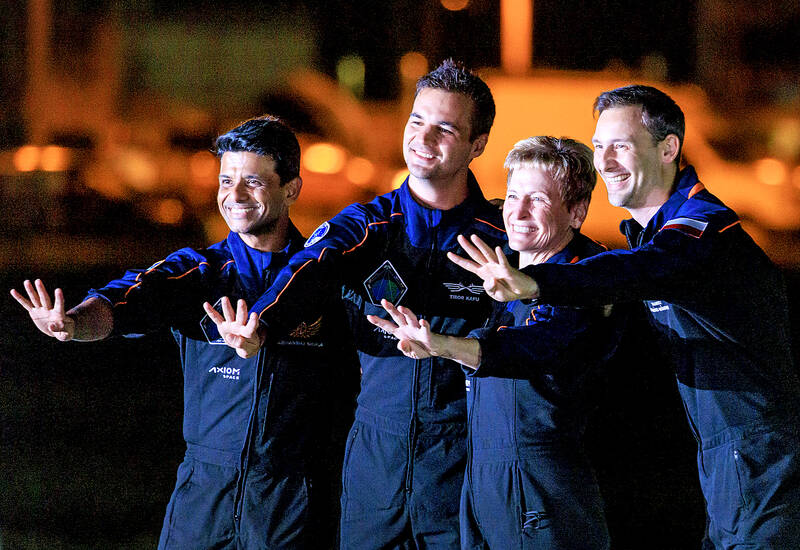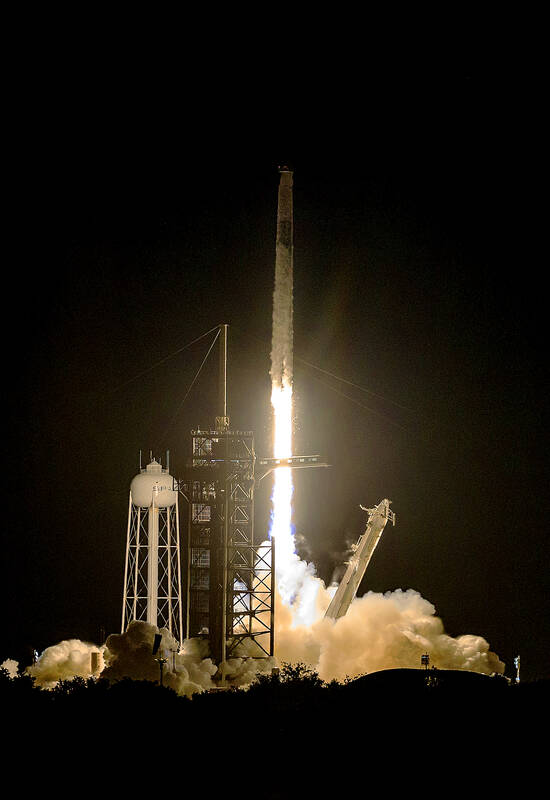India, Poland and Hungary yesterday launched their first astronauts in more than 40 years, sending them on a private flight to the International Space Station (ISS).
The three countries shared the tab for the two-week mission.
Axiom Space, the Houston company that arranged the deal, put the ticket price at more than US$65 million per customer.

Photo: EPA
SpaceX’s Falcon rocket blasted off from NASA’s Kennedy Space Center two weeks late because of space station leak concerns. The capsule on top carried not only the three newcomers to space — none of whom were alive when their countries’ first astronauts launched — but the US’ most experienced astronaut, Peggy Whitson.
Besides Whitson, the crew is India’s Shubhanshu Shukla, a pilot in the Indian Air Force; Hungary’s Tibor Kapu, a mechanical engineer; and Poland’s Slawosz Uznanski-Wisniewski, a radiation expert and one of the European Space Agency’s project astronauts sometimes pressed into temporary duty.
The astronauts were due to arrive at the orbiting lab this morning.

Photo: EPA
In addition to dozens of experiments, the astronauts are flying food that celebrates their heritage: Indian curry and rice with mango nectar; spicy Hungarian paprika paste; and freeze-fried Polish pierogies.
Hungary’s first astronaut, Bertalan Farkas, traveled to the launch site to cheer on Kapu.
Farkas launched with the Soviets in 1980, taking along a teddy bear in a cosmonaut suit that went back up with Kapu. India and Poland’s original astronauts also launched with the Soviets in the late 1970s and 1980s.
Uznanski-Wisniewski carried up the Polish flag worn on his predecessor’s spacesuit, noting that Miroslaw Hermaszewski was his biggest supporter until his death in 2022.
India’s first astronaut, Rakesh Sharma, could not make it to Florida for the launch.
Shukla said that Sharma has been a mentor “at every step of this journey” and is flying a surprise gift for him.
While others born in India and Hungary have flown in space before — including NASA astronaut Kalpana Chawla, who died aboard the shuttle Columbia in 2003, and two-time space tourist Charles Simonyi, of Microsoft fame — they were US citizens at the time of launch.
Shukla said before the flight that he hopes “to ignite the curiosity of an entire generation in my country” and drive innovation.
Like his crewmates, he plans several outreach events with those back home.
“I truly believe that even though I, as an individual, am traveling to space, this is the journey of 1.4 billion people,” he said.
Once in orbit, the astronauts radioed messages in their native languages and revealed the name they gave to their brand-new capsule: Grace.
“Good things come to those who wait,” SpaceX told the crew. “Godspeed to the maiden crew of Grace.”

VAGUE: The criteria of the amnesty remain unclear, but it would cover political violence from 1999 to today, and those convicted of murder or drug trafficking would not qualify Venezuelan Acting President Delcy Rodriguez on Friday announced an amnesty bill that could lead to the release of hundreds of prisoners, including opposition leaders, journalists and human rights activists detained for political reasons. The measure had long been sought by the US-backed opposition. It is the latest concession Rodriguez has made since taking the reins of the country on Jan. 3 after the brazen seizure of then-Venezuelan president Nicolas Maduro. Rodriguez told a gathering of justices, magistrates, ministers, military brass and other government leaders that the ruling party-controlled Venezuelan National Assembly would take up the bill with urgency. Rodriguez also announced the shutdown

Civil society leaders and members of a left-wing coalition yesterday filed impeachment complaints against Philippine Vice President Sara Duterte, restarting a process sidelined by the Supreme Court last year. Both cases accuse Duterte of misusing public funds during her term as education secretary, while one revives allegations that she threatened to assassinate former ally Philippine President Ferdinand Marcos Jr. The filings come on the same day that a committee in the House of Representatives was to begin hearings into impeachment complaints against Marcos, accused of corruption tied to a spiraling scandal over bogus flood control projects. Under the constitution, an impeachment by the

Exiled Tibetans began a unique global election yesterday for a government representing a homeland many have never seen, as part of a democratic exercise voters say carries great weight. From red-robed Buddhist monks in the snowy Himalayas, to political exiles in megacities across South Asia, to refugees in Australia, Europe and North America, voting takes place in 27 countries — but not China. “Elections ... show that the struggle for Tibet’s freedom and independence continues from generation to generation,” said candidate Gyaltsen Chokye, 33, who is based in the Indian hill-town of Dharamsala, headquarters of the government-in-exile, the Central Tibetan Administration (CTA). It

China executed 11 people linked to Myanmar criminal gangs, including “key members” of telecom scam operations, state media reported yesterday, as Beijing toughens its response to the sprawling, transnational industry. Fraud compounds where scammers lure Internet users into fake romantic relationships and cryptocurrency investments have flourished across Southeast Asia, including in Myanmar. Initially largely targeting Chinese speakers, the criminal groups behind the compounds have expanded operations into multiple languages to steal from victims around the world. Those conducting the scams are sometimes willing con artists, and other times trafficked foreign nationals forced to work. In the past few years, Beijing has stepped up cooperation